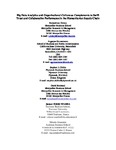Big Data Analytics and Organizational Culture as Complements to Swift Trust and Collaborative Performance in the Humanitarian Supply Chain
| dc.contributor.author | Dubey, R | |
| dc.contributor.author | Gunasekaran, A | |
| dc.contributor.author | Childe, Stephen J | |
| dc.contributor.author | Roubaud, D | |
| dc.contributor.author | Fosso Wamba, S | |
| dc.contributor.author | Giannakis, M | |
| dc.contributor.author | Foropon, C | |
| dc.date.accessioned | 2019-01-17T14:00:04Z | |
| dc.date.issued | 2019-04 | |
| dc.identifier.issn | 0925-5273 | |
| dc.identifier.uri | http://hdl.handle.net/10026.1/13157 | |
| dc.description.abstract |
The main objective of the study is to understand how big data analytics capability (BDAC) as an organizational culture can enhance trust and collaborative performance between civil and military organizations engaged in disaster relief operations. The theoretical framework is grounded in organizational information processing theory (OIPT). We have conceptualized an original theoretical model to show, using the competing value model (CVM), how BDAC, under a moderating influence of organizational culture, affects swift trust (ST) and collaborative performance (CP). We used WarpPLS 6.0 to test the proposed research hypotheses using multi-respondent data gathered through an email questionnaire sent to managers working in 373 organizations, including the military forces of different countries, government aid agencies, UN specialized agencies, international non-government organizations (NGOs), service providers, and contractors. The results offer four important implications. First, BDAC has a positive, significant effect on ST and CP. Second, flexible orientation (FO) and controlled orientation (CO) have no significant influence on building ST. Third, FO has a positive and significant moderating effect on the path joining BDAC and CP. Finally, CO has negative and significant moderating effect on the path joining BDAC and CP. The control variables: temporal orientation (TO) and interdependency (I) have significant effects on ST and CP. These results extend OIPT to create a better understanding of the application of information processing capabilities to build swift trust and improve collaborative performance. Furthermore, managers can derive multiple insights from this theoretically-grounded study to understand how BDAC can be exploited to gain insights in contexts of different management styles and cultures. We have also outlined the study limitations and provided numerous future research directions. | |
| dc.format.extent | 120-136 | |
| dc.language | en | |
| dc.language.iso | en | |
| dc.publisher | Elsevier | |
| dc.subject | Networking and Information Technology R&D (NITRD) | |
| dc.title | Big Data Analytics and Organizational Culture as Complements to Swift Trust and Collaborative Performance in the Humanitarian Supply Chain | |
| dc.type | journal-article | |
| dc.type | Journal Article | |
| plymouth.volume | 210 | |
| plymouth.publication-status | Published | |
| plymouth.journal | International Journal of Production Economics | |
| dc.identifier.doi | 10.1016/j.ijpe.2019.01.023 | |
| plymouth.organisational-group | /Plymouth | |
| plymouth.organisational-group | /Plymouth/Faculty of Arts, Humanities and Business | |
| plymouth.organisational-group | /Plymouth/Faculty of Arts, Humanities and Business/Plymouth Business School | |
| plymouth.organisational-group | /Plymouth/REF 2021 Researchers by UoA | |
| plymouth.organisational-group | /Plymouth/REF 2021 Researchers by UoA/UoA17 Business and Management Studies | |
| plymouth.organisational-group | /Plymouth/Users by role | |
| plymouth.organisational-group | /Plymouth/Users by role/Academics | |
| dcterms.dateAccepted | 2019-01-16 | |
| dc.rights.embargodate | 2020-7-20 | |
| dc.rights.embargoperiod | Not known | |
| rioxxterms.versionofrecord | 10.1016/j.ijpe.2019.01.023 | |
| rioxxterms.licenseref.uri | http://www.rioxx.net/licenses/all-rights-reserved | |
| rioxxterms.licenseref.startdate | 2019-04 | |
| rioxxterms.type | Journal Article/Review |


